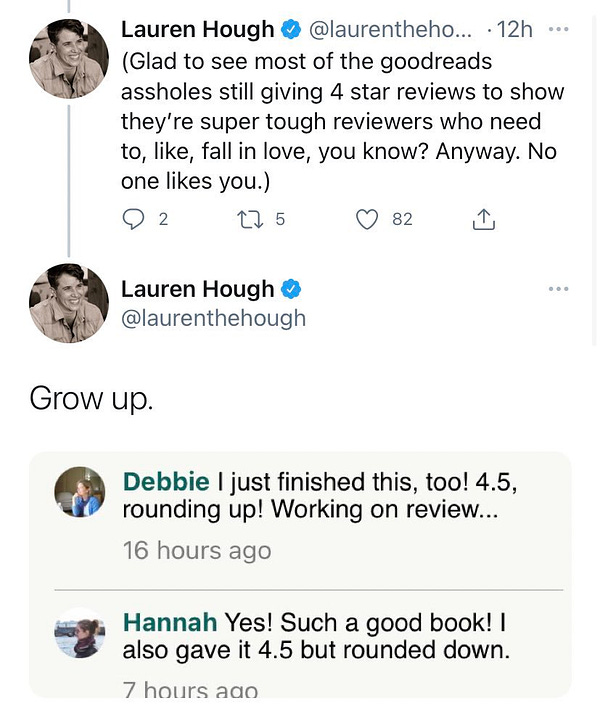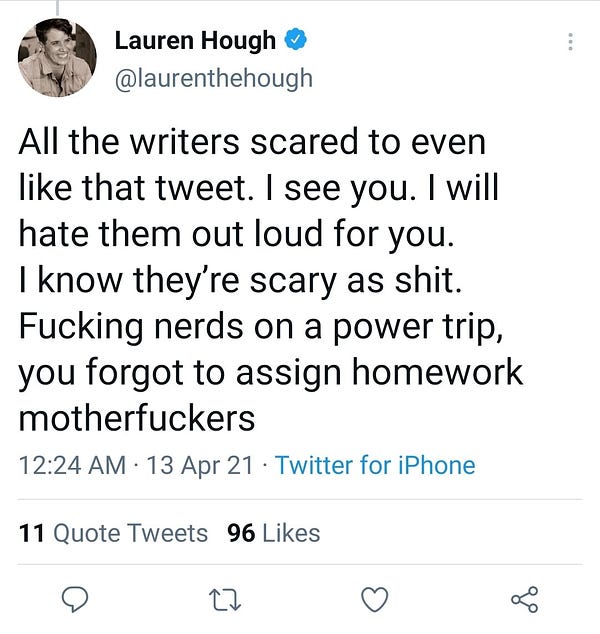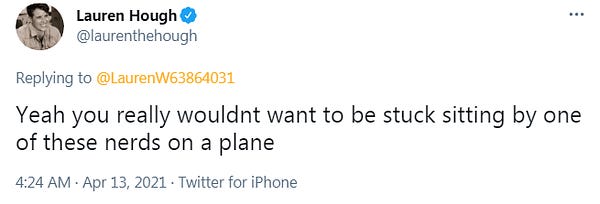A newsletter sounded like a great idea until I had to actually write it. Surprise, I don’t have much to say that I don’t feel stupid for saying!
Part of the problem is that I wanted to make this about books even though I already have an entire instagram about books. It seems ridiculous and exhausting to just repeat myself in both places, and literally no one cares!
So today I’m bringing you an un-nuanced slice of niche, bookish internet drama that I fell into a rabbit hole of. It all began with a very hot take from author Lauren Hough, who has a new book called Leaving Isn’t the Hardest Thing (it’s about how she GREW UP IN A CULT, which, drama aside, I will read about all day). Upon seeing the Goodreads ratings for the book and apparently being unhappy that they weren’t all five stars, she made the mistake that so many of us have: confusing our Twitter accounts for our diaries. She deleted the original tweets, but of course there are screenshots:




I have several thoughts here, but first: why? Literally, why? It’s a strange take to hate four- and 4.5-star reviews in the first place (are the one-stars not worse?), but she has also doubled down and actually had her friends block and bully anyone who’s mentioned her on Twitter. I’m mostly just confused about why anyone would think this would work, because it didn’t, and people flooded to Goodreads to purposely tank the rating. It got down to as low as 1.7, but it’s now at a whopping 1.8 with 3,530 ratings (as of the evening of April 22). And regardless of the circumstances that led to an artificially bad rating, it’s pretty shitty for her too.
I’m not here to dunk on an author whose work I’ve never read or laugh at her misfortune, so I’ll refrain from getting personal and instead say that there is no book that will be a perfect book for every single reader, and that’s something writers have to accept or at least pretend to accept. It’s something readers have to accept too. I don’t know that it’s fair to call Lauren “ungrateful” as plenty of tweets have done, because I don’t think anyone owes anyone any gratitude here, but the author-reader relationship is a symbiotic one that requires active participation and respect from all parties. And no one is better than anyone for liking or disliking a book that others felt differently about. I will shout from the rooftops for the rest of my reading days that you are not superior because of your reading tastes.
But it has had me thinking A LOT about reading and writing in the internet age. I’m an over-sharer in all realms of life (hi to my group chats, sorry for the 15 texts I’ve sent in quick succession to each of you as I’ve been writing this), so the whole blabbing about books on the internet thing is a natural extension for me.
But clearly I’m not alone in my love of talking about books with friends and strangers alike. There are tens of thousands of bookstagram accounts out there, some of which actually have hefty followings, along with good old-fashioned book blogs, book YouTube channels, book tweets, and book TikTok accounts if you’re young and cool (and BookTok is actually where the money is, so maybe you should be). There are a whopping 90 million+ users on Goodreads. My new favorite reading tracker, The StoryGraph, might not rival Goodreads in numbers yet but is a far more interactive and overall better platform, and its creation to fill in the gaps that Goodreads has left shows just how much people who read want to share what they’re reading.
I know there are a lot of grumpy purists who wonder why we can’t just get back to reading without all this extra stuff. I don’t disagree, to some extent; Goodreads has yearly challenges that turn reading into a competition you can somehow win, and bookstagram turns reading into a popularity contest. It can be a lot, and it’s without a doubt unnecessary to your enjoyment as a reader. But I’d also argue that all this online-ness has encouraged more people to read, and most importantly, people — including kids — who might not otherwise have been encouraged to do so.
And all this online-ness also lets readers engage with their favorite authors, which is incredibly cool for the kind of “fucking nerds” Lauren Hough describes. This can, of course, be bad for readers — this whole twitter rant thing, sure, but what comes to mind first is J.K. Rowling’s dangerous and disgusting transphobic rhetoric. And it can be bad for authors too, who have to develop the world’s thickest skin to deal with the wealth of people who now fancy themselves professional book critics and aren’t quiet about it.
So I’m wondering what everyone’s obligations are here in the age of the internet — what do readers and reviewers owe authors, and what do authors owe their readers?
Goodreads is notoriously lackluster, and I’ll be the first to admit how flawed a system that only allows you to choose five options for rating a book can be. Anyone who’s spent five minutes on the platform has their fair share of valid complaints, so I can only imagine how infuriating it must be for authors to watch subjective star ratings of their life’s work roll in. And as LitHub pointed out last year, Goodreads is actually just kind of sexist. I imagine the problem only gets worse for authors of color and in the LGBTQ+ community. So to that extent, I sympathize with Lauren Hough and other authors who have been penalized because of haphazard ratings that took all of 10 seconds and one tap to decide. A rating system should be helpful, in theory, but it becomes a problem when we give it too much power or interpret it too literally.
But authors are also not owed glowing reviews, regardless of how much time or effort or love went into their work. There will be someone, somewhere who doesn’t like it. There will probably be a lot of someones who don’t like their books. I’ve noticed that the folks who get advanced reader copies of books are more likely to give those books good reviews, or at least feel guilty if they don’t; after all, they received a free book ahead of publication, so aren’t the publisher and author doing them a favor? No!!! There’s something so uncomfortable about purposely padding book reviews. It reminds me of influencer culture, where we’re hardly getting an honest review of anything and ratings are incredibly inflated, whether it’s cosmetics or fast fashion or 10 Amazon products I would literally die without (swipe up!)
So all of us very amateur book people need to be thoughtful in our reviews and ratings, and we especially need to keep an open mind when deciding why we did or didn’t like a book. More readers, myself included, need to take stock of their own biases before rating, recommending, or condemning a book. But we also need honesty! Goodreads is mostly terrible, but wouldn’t it be more terrible if we were only shown the five-star reviews?
I wrote all of this and now I realize that really all I have to say is that everyone thinks they’re a little more important than they are, especially on the internet. And that’s okay because that’s literally just what being a human is, but can we at least keep the pettiness fun, like that weird time when Martha Stewart and Gwyneth Paltrow came for each other via cakes?
I guess I could also tell you what I’ve been reading in my very long absence! brb let me consult …my Goodreads… for the ones of note.
Red at the Bone by Jacqueline Woodson — just really great and thoughtful and perfect for anyone who needs a shorter book right now.
Detransition, Baby by Torrey Peters — I’ve recommended this book to so many people and I’m not stopping yet! Such a reflective book about gender and motherhood, and I believe it’s the first book nominated for the Women’s Prize for Fiction by a trans woman.
A Little Life by Hanya Yanagihara — look idk why I did this to myself during a time where I am not feeling the most mentally stable, but holy shit is this book just as good as everyone says it is.
A Certain Hunger by Chelsea G. Summers — a food critic/writer who also happens to be a serial killer who EATS her lovers? Say no more.
Valley of the Dolls by Jacqueline Susann — a classic, so my thoughts aren’t necessary here, but it did really like it because of course I was going to, and I am still trying to figure out what I want to say in regards to classics using offensive language or slurs and how we navigate that in the 21st century.
Sorrow and Bliss by Meg Mason — calling this a book about a 40-year-old woman whose life is falling apart because she’s mentally ill and in the process of separating from her husband sounds so boring and cliche, but I promise, it’s really not. It’s both heartwarming and heartbreaking, but in a dry British humor sort of way.
And some recently published books on my radar:
Leaving Isn’t the Hardest Thing by Lauren Hough — heh heh I had to include it, plus maybe you actually do want to read the book (I for one am tempted, even if putting it on my Goodreads will make me a fucking nerd on a power trip).
World Travel by Anthony Bourdain and Laurie Woolever — I’m not sure if this will be any good, but I’m sure it’ll give everyone who misses Bourdain (me) plenty of reasons to cry.
Crying in H Mart: A Memoir by Michelle Zauner — this looks very enjoyable, I love the cover, and I love crying.
This is awfully long and I will personally venmo you $5 if you made it to the end and didn’t unsubscribe! Thanks for being my friend, I do not deserve the support I get for dumb newsletters like this xoxo



